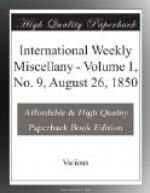“The Tarikh Zenadikah (way of the covetous) are directly opposed to the last on the subject of transmigration; and they believe that God is in all places, and performs all things. They likewise maintain that the whole visible universe is only a manifestation of the Supreme Being; the soul itself being a portion of the Divine essence. Therefore, they consider, that whatever appears to the eye is God, and that all religious rites should be comprised in the contemplation of God’s goodness and greatness.
“On these various creeds the different branches of Suffeeism seem to have been founded. One of the most extraordinary of these sects is the Rashaniyah; the followers of which believe in the transmigration of souls, and the manifestation of the Divinity in the persons of holy men. They maintain likewise, that all men who do not join their sect are to be considered as dead, and that their goods belong, in consequence, to the true believers, as the only survivors.”
* * * * *
THE “OLD DUKE OF QUEENSBURY.”
Mr. Burke gives in his gossiping book about the English aristocracy, the following anecdotes of this once famous person:
“Few men occupied a more conspicuous place about the court and town for nearly seventy years, during the reigns of the Second and Third Georges. Like Wilmot Earl of Rochester, he pursued pleasure under every shape, and with as much ardor at fourscore as he had done at twenty. At the decease of his father, in 1731, he became Earl of March; and he subsequently, in 1748, inherited his mother’s earldom of Ruglen, together with the family’s estates in the counties of Edinburgh and Linlithgow. These rich endowments of fortune, and a handsome person, of which he was especially careful, combined to invest the youthful Earl with no ordinary attractions, and the ascendency




